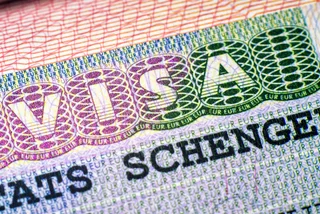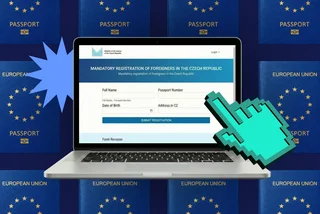Every non-EU citizen living in Czechia knows the importance – and necessity – of holding proof of accommodation when applying for a visa to stay in the country. To simplify the process, many explore the gray, legally murky market of securing valid housing contracts for residences they won’t actually live in. A joint report by news sites Investigace.cz and Deník N reveals how this puts foreigners at serious risks of scams – or even losing the right to live in Czechia.
Taking the easy route – with high risks
Securing a housing contract for visa purposes is not always a straightforward task – especially if dealing with paperwork from abroad and needing to submit proof of housing before even being allowed to enter Czechia.
One way to tackle this issue is by getting a valid contract for an address despite not living there, usually for a fee several times cheaper than one month’s rent. Many agencies in Prague and nationwide offer this legally ambiguous service. But what are the risks?
Klára Holíková, head of the legal department of the human rights non-profit organization Association for Migration and Integration"While Czechs can live in an unapproved apartment or in non-residential premises, foreigners do not have this option, because they cannot register their stay in such an apartment, so they are forced to obtain a confirmation from another accommodation provider.”
A large, legally shady, market
Investigace.cz reporters went undercover, contacting multiple document vendors via messaging apps and social media. One vendor on Facebook named "Anatolij" offered one-year contracts – including a mailbox service where people could receive and check mail sent to the address – for CZK 4,500.
Another firm, ESM INVEST, charged almost CZK 7,000 per document. The cheapest option advertised by an unknown seller called "Miša Garastěj" through Telegram involved outright forgeries for just CZK 2,500.
Even established firms typically used for expat relocation services offer the service. “Arrange legitimate accommodation proving your residence address in the Czech Republic with all legal requisites (a legitimate property and the certified signature of a landlord) that are accepted by Czech embassies and the Immigration Office,” says one firm.
Foreigners could get visas canceled
Prague-based lawyer Denis Kašicyn has been dealing with the “non-residence” contract issue for the past decade. According to him, people must actually reside at the address displayed in the housing contract. Falsifying this can lead to a large financial penalty and the cancellation of a visa (or an unsuccessful visa application).
In this case, foreigners are more at risk than the agencies that sell the dubious contracts. "It is very difficult to prove that they [the contract sellers] are aiding the illegal stay of foreigners. Selling proof of accommodation to foreigners is not a crime. It is not the responsibility of the sellers whether the person who purchased the contract will actually live at the specified address,” Kašicyn says.
Random apartment checks
The agencies that sell these contracts often use addresses from the same apartment or building. As this is a widespread issue, the Interior Ministry often recognizes the same addresses being submitted.
Spokesperson for the foreign police Josef Urban says the police "receives requests for address verification from the Department of Asylum and Migration Policy” every week. Police, therefore, often check the addresses that most often appear on the contracts – finding that the owner of the contract does not actually live there.
The contract may not even be valid
Other risks also exist – for example, the contract may be plainly illegitimate and essentially useless. This could as a result of the document not being notarized or simply lacking the landlord’s signature. Foreigners, therefore, are at risk of spending thousands of crowns for nothing – some individuals and small firms knowingly scam unsuspecting people who simply hope to navigate bureaucracy more easily.
Finding a place to live and sourcing a legitimate contract can be a complex task – particularly when outside the country. For foreigners, though, taking the more convenient option via third-party contract sellers can bring catastrophic results.












 Reading time: 3 minutes
Reading time: 3 minutes 





























